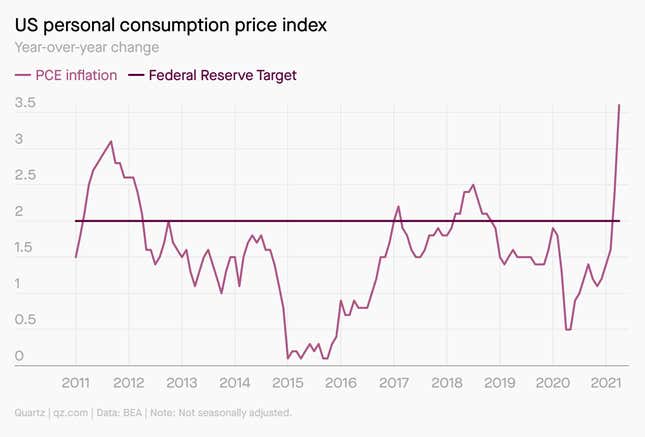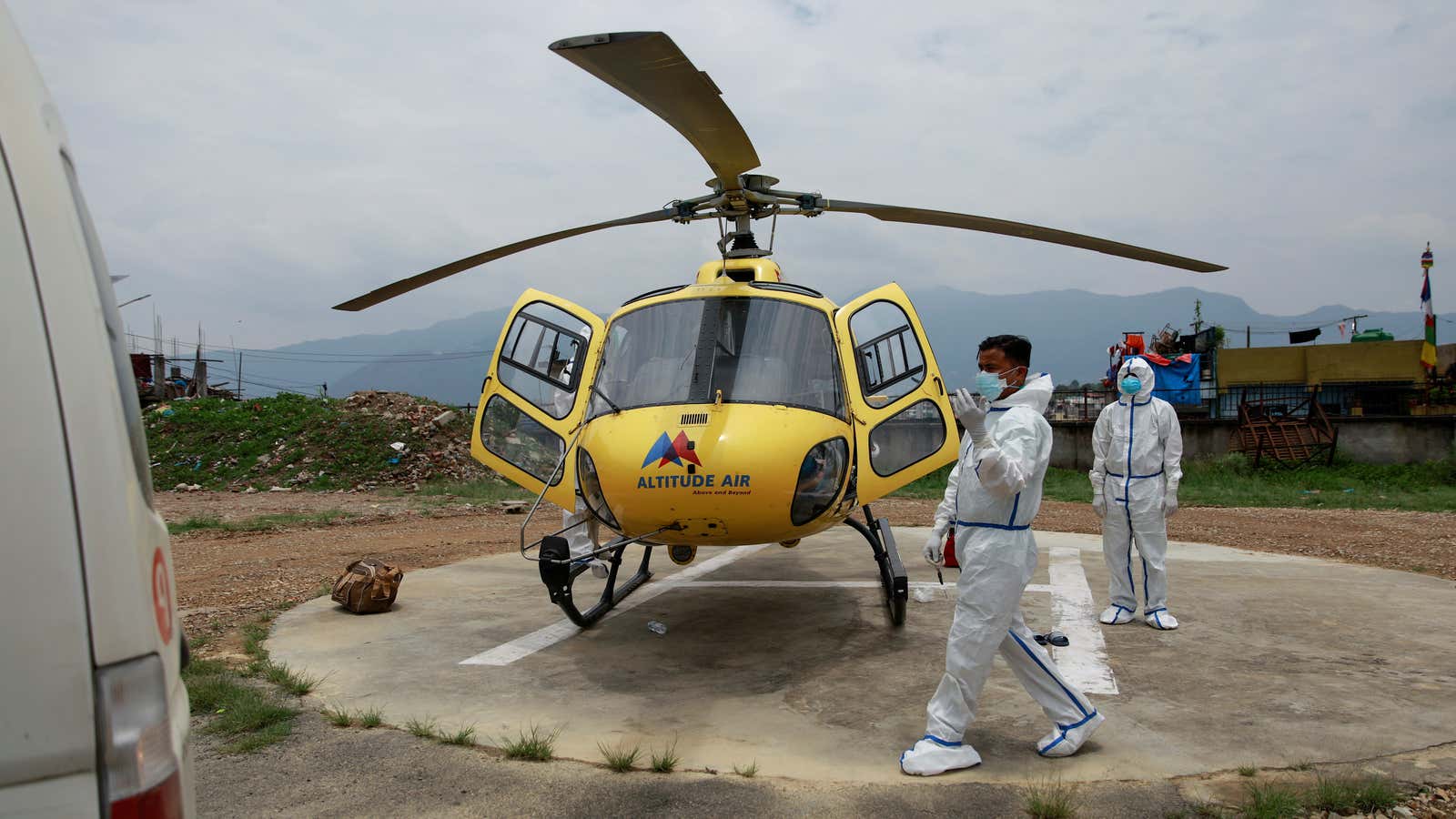Good morning, Quartz readers!
Here’s what you need to know
India pressed the US for vaccines. In a meeting with US Secretary of State Anthony Blinken, S Jaishankar, India’s foreign minister, brought up the US’ stockpiling of Covid-19 vaccines as well as India’s aim to expand its vaccine manufacturing capabilities.
Nepal is on the brink of a health emergency. Migrant workers returning from India have driven a surge of Covid-19, in which 40% of tests are returning positive.
China’s low fertility rate worries the army. The People’s Liberation Army, which drafts hundreds of thousands of youngsters each year, has lowered some of its education and physical standards for new recruits to keep its ranks full.
Chinese tech giants are losing value. The combined market cap of the 10 largest tech companies in China has fallen by $800 billion, or roughly 30%, since February.
Ho Chi Minh City enacts social distancing measures. Shops and restaurants will shut down until further notice, and all gatherings of more than 10 people are banned.
Opposition politicians are uniting to oust Netanyahu. The proposed replacement: Naftali Bennett, a former education minister and tech millionaire with far-right views, intent on annexing parts of the Palestinian West Bank.
Germany agreed to apologize for killing thousands in Namibia between 1904 and 1908. Germany is offering $1.35 billion to help develop the country, but Namibian leaders said the money was insufficient.
What to watch for
After a ferocious second wave of Covid-19, Delhi will slowly emerge from a six-week lockdown starting May 31. In the first phase, construction sites and factories will be permitted to resume operations, Arvind Kejriwal, Delhi’s chief minister, said. This is designed to help daily wage workers: laborers who are assigned work—and paid—on a day-to-day basis, and whose livelihoods were devastated by the pandemic. But Kejriwal urged others to stay home, warning that Delhi would lock down again if cases rise.
A suffering capital: Through April, Delhi provided some of the most wrenching news of India’s second wave: hospitals running out of oxygen, patients begging doctors for treatment, cremation grounds so full that parks and parking lots had to be repurposed to burn dead bodies. Between April 1 and May 30, at least 13,000 people died in the city; even that number is likely to be an underestimate of the full toll.
Opening up: Much of the rest of India is still locked down, so Indians will keenly watch Delhi’s tentative foray into the open, to see how the city fares. From June 7, Delhiites can move around the city for non-essential activities, but the Metro will remain suspended. The government hasn’t indicated when restaurants and non-essential shops will reopen. Delhi will thus become a test case for India’s dire dilemma: balancing the need to save lives with the need to restart a struggling economy. “It shouldn’t be the case,” Kejriwal said, “that people survive the coronavirus but die of starvation.”
Vaccines needed: Delhi has administered only around 5.3 million vaccine doses, so there’s a long way to go to reach all the 31 million or so people who live in the greater metropolitan area.
Charting US inflation
The talking point from the latest US government report on consumer spending will be the increase in prices paid by Americans for what they’re buying. Prices increased 3.6% in April 2021, compared to the same time last year.

But this increase is due to the unusual situation of the economy recovering from the shock of the pandemic, which shut down businesses and disrupted supply lines in arbitrary ways. When people want to buy goods and services that haven’t been available, they are going to find that some of the businesses that provided them closed, others need to raise prices to recover, and that supply chains have been disrupted and need to be reconstituted. These factors will drive higher prices.
This kind of inflation is not taking the Federal Reserve by surprise: It is the intentional result of its policy stance. Since last summer, the Fed has said it will sometimes aim for inflation “moderately above 2%” to ensure that it hits its goal of an average of 2% inflation over time.
Making VC more inclusive
There’s no question that there’s lots of money in venture capital (VC) these days—spending soared to a record $131 billion in 2018. But barely 1% of VC funding that year went toward Black or brown entrepreneurs.
Anthony Oni, managing partner and CEO of Elevate Future Initiative at investment firm Energy Impact Partners, has some suggestions for how VCs can approach opportunities to fund Black founders:
💡 Provide space for ideation and access to world-class technology
👯 Provide access to mentors and a supportive community
👂 Hear and empathize with Black founders’ stories, demonstrating success against all odds
✦ Read the op-ed here as part of your Quartz membership. Try it free for a week.
Handpicked Quartz
🇨🇳 HKEX is key to China’s plan to internationalize its economy
💲 The world’s largest crypto exchanges have invested in India despite unfriendly policies
💉 Big Tech platforms are getting in the way of Africa’s vaccine roll out
⚖️ An Indian court’s judgment in a high-profile rape case is a giant leap backward for women
📈 Soaring commodity prices are bringing a Chinese lithium giant back from the brink
🔒Big pharma wants you to think sharing vaccine patents overseas is very dangerous
💉 How many Covid vaccines go to waste?
🚂 Engine No. 1: The little hedge fund that shook Big Oil
💪 Biden’s budget shows the big-spending state is here to stay
🌾 How geological research has upended our understanding of historical African farming
🧪 America has a rich history of innovation by Asian immigrants
🌍 Siri and Alexa still don’t support African languages
Surprising discoveries
A real-life “Schitt’s Creek.” For years now, the owner of Nipton, an 80-acre, 25-resident town an hour from Las Vegas, has been trying to sell it. The price? $2.75 million.
A Bitcoin mine was hiding in a marijauana farm. In Birmingham, UK, police raided a cannabis farm and found a Bitcoin mine that was stealing electricity from the grid.
Boris Johnson got married in secret. The British prime minister and his partner Carrie Symonds tied the knot in front of 30 guests at Westminster Cathedral.
Germs are cleaning Michelangelo’s sculptures. In the Medici Chapel in Florence, scientists and restorers are deploying bacteria to eat away at stains on marble sculptures.
Mice overrun eastern Australia. In “the worst mouse plague in living memory,” the rodents are eating their way through stores of grain, nibbling at people as they sleep, and biting the toes off chickens.
Our best wishes for a productive day. Please send any news, comments, mouse traps, and bids for the town of Nipton to [email protected]. Get the most out of Quartz by downloading our iOS app and becoming a member. Today’s Daily Brief was brought to you by Samanth Subramanian, Tim Fernholz, and Walter Frick.
